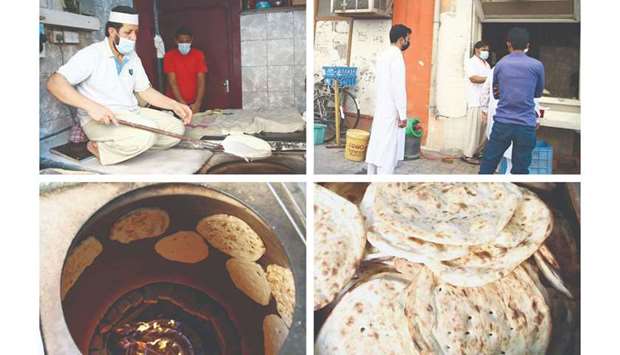Tandoori roti (oven-baked bread) has been a popular food among residents and national alike, particularly among South Asian expatriates countries residing in Qatar.
Tandoor bakeries selling the bread have see a rise in their business during the holy month of Ramadan.
The ever-popular tandoori roti is in high demand just before Iftar and Suhoor during Ramadan as those fasting, particularly from Pakistan, India, Bangladesh and Nepal, consume the roti as their staple. It is not costly and readily available.
As a large number of workers from these countries live in Qatar without families, they tend to buy the bread from the tandoor bakeries.
“To have a big and hot tandoori roti at your dining table gives a good feeling particularly after long hours of fasting at Iftar time. It smells aromatic and tastes delicious. It is readily available a hot staple unlike other breads (khubz) that are packaged and sold at stores.
“Khubz may be cheaper but it does not taste as good as roti,” claims Shaheen Shah, a long-time Pakistani expatriate in Qatar.
The tandoori roti bakeries have been present in Qatar for a long time. The business is dominated by people of Pashtun ethnicity from Pakistan.
“I have been in Qatar for over 35 years and my late father came here in the mid 1960s. The tandoori roti bakeries were initially started by the Pashtun community. However, I have also seen Iranian tandoors as well in different areas of Doha.
“I still remember going with my father to a nearby tandoor to get the rotis as a child. Though my mother used to bake bread at home we would often eat tandoori roti as we found it more delicious,” said Shah, who too is a Pashtun.
One major point in the popularity of the tandoori roti is the presence of large South Asian population, particularly workers.
“You do not need to have the hassle of baking bread at home. Go to a nearby tandoor and buy a hot roti for one riyal. The roti is larger in size compared to khubz. One roti is often sufficient for two persons.
“Moreover, you get the taste of roti similar to what you have back in your own country,” said Abdul Razzak, a Pakistani expatriate, who drives a cab and lives with a group of taxi drivers in an apartment in Al Mansoura.
Razzak finds it very convenient to purchase tandoori roti during Ramadan because all his roommates tend to dine together more during the holy month.“We often have our Iftar and Suhoor together at home during Ramadan.
“We are all men so we prefer to buy tandoori roti. At Suhoor time, tandoori paratha is also available at these bakeries.
“We often go to the tandoor well before Iftar and Suhoor as otherwise there are long queues as tandoors are not available everywhere in Qatar.”
Baking tandoori roti is a skill that is not easily available in Qatar.
The business that had already been facing challenges has been hit hard by the Covid-19 pandemic. “Although there is good demand for tandoori rotis in Qatar it is not easy to run the business smoothly. A minimum of three skilled workers are necessary to run one bakery. They have to work for at least 12 hours every day in a hot room with a burning oven. In areas where the demand is more we may need five people for one bakery,” revealed Mohamed Shah, an expatriate from Peshawar who runs his business in Najma.
For Shah, business was good earlier but now faces challenges.“Earlier many used to run it as a family business with brothers jointly running a bakery. However, it is different now. Shop rents are high and while we would have preferred to hire skilled bakers from Pakistan this has not been possible since the Covid-19 outbreak.
“We are forced to hire locally trained people who often ask higher wages. It is not easy to bake some 1, 000 to 1, 500 breads every day.
“The good thing however is that bakers from countries other than Pakistan are also getting in to the trade. Bakers particularly from Bangladesh and Nepal can nowadays be seen at tandoors. These workers often have had hands-on training.”
PICTURES: Jayan Orma

The ever-popular tandoori roti is in high demand just before Iftar and Suhoor during Ramadan as those fasting, particularly from Pakistan, India, Bangladesh and Nepal, consume the roti as their staple.
